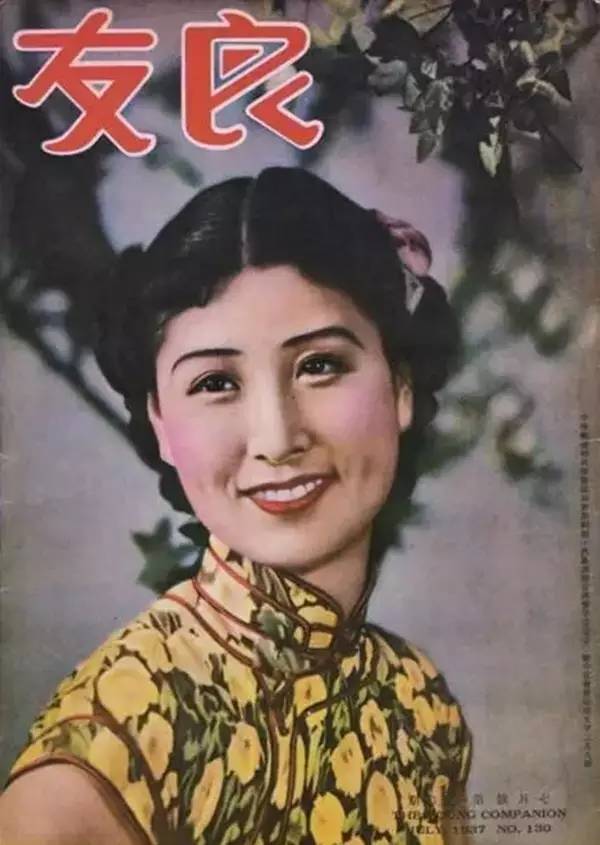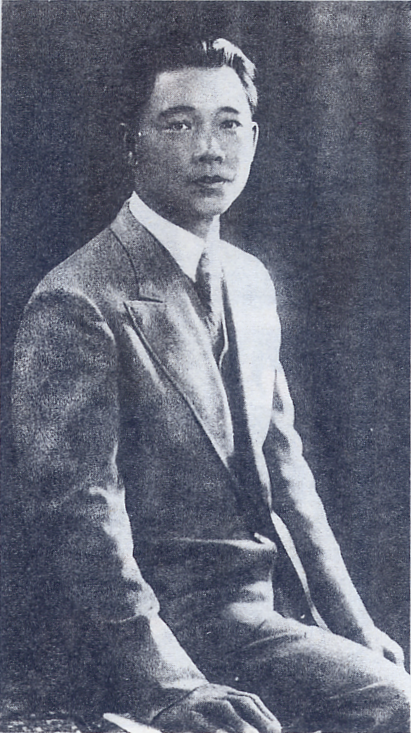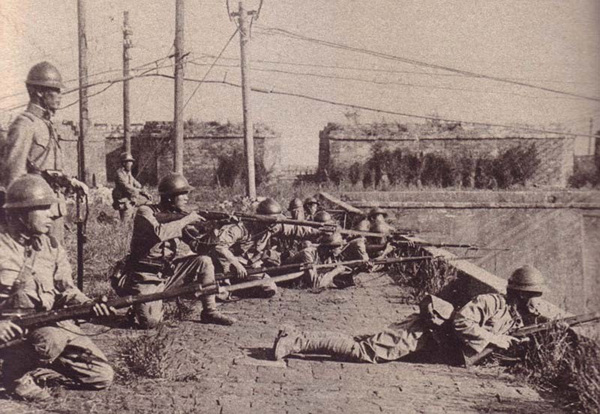|
Zheng Pingru
Zheng Pingru (1918 – February 1940) was a Chinese socialite and spy who gathered intelligence on the Imperial Japanese Army during the Second Sino-Japanese War. She was executed after an unsuccessful attempt to assassinate Ding Mocun, the security chief of the Wang Jingwei regime, a puppet government for the Japanese. Her life is believed to be the inspiration for Eileen Chang's novella ''Lust, Caution'', which was later adapted into the eponymous 2007 film by Ang Lee. Early life Zheng Pingru was born in 1918 in Lanxi, Zhejiang Province, Republic of China. Her father, Zheng Yueyuan (), also known as Zheng Yingbo (), was a Nationalist revolutionary and a follower of Sun Yat-sen. While a student in Japan, Zheng Yueyuan married a Japanese woman, , who adopted the Chinese name Zheng Huajun (). They had two sons and three daughters; Pingru was the second oldest daughter. From her mother, Zheng Pingru learned to speak Japanese fluently. She grew up in Shanghai, where her fath ... [...More Info...] [...Related Items...] OR: [Wikipedia] [Google] [Baidu] |
Zheng (surname)
Zheng ( zh, t=鄭, s=郑, p=Zhèng, w=Cheng4, ) is a Chinese surname. It is the 7th name on the '' Hundred Family Surnames'' poem. In 2006, Zheng ranked 21st in China's list of top 100 most common surnames. Zheng belongs to the second major group of ten surnames which makes up more than 10% of the Chinese population. Zheng was a major surname of the rich and powerful during China's Tang dynasty. In Republic of China (Taiwan) and Hong Kong, the name is normally romanized as Cheng or Tcheng (occasionally romanized as Chang in Hong Kong although that variant is more commonly used for another Chinese name, Zhang). In Malaysia, Cheng is commonly romanized as Cheng, Cheang, Chang, Tay, Tee and Teh. It is spelled as Tay in Singapore, The in Indonesia, and Ty in Philippines, from the Hakka, Hokkien and Teochew pronunciation of the character. It is also romanized as Dang from Hokchew. The surname also has taken form outside of Chinese societies: in Korean, the name is written 정 ... [...More Info...] [...Related Items...] OR: [Wikipedia] [Google] [Baidu] |
Hu Die
Hu Die (; 1907–08 — April 23, 1989), also known by her English name Butterfly Wu, was a popular Chinese actress during the 1920s and 1930s. She was voted China's first "Movie Queen" in 1933, and won the Best Actress Award at the 1960 Asian Film Festival for her performance in ''Rear Door''. Biography Early life Hu Die was born Hu Ruihua () in Shanghai in 1907 or 1908, and moved to Guangzhou (Canton) when she was nine. Her father then became the general inspector of the Beijing–Fengtian Railway. She spent much of her adolescence in northern cities including Beijing, Tianjin and Yingkou, and learned to speak perfect Mandarin, which later proved to be a great advantage when the cinema of China transitioned from silent films to talkies. In 1924, Hu Ruihua moved back to Shanghai with her family. When China (Zhonghua) Film School, the country's first film actor training school, opened, she was the first student to enroll. She adopted the professional name "Hu Die", mean ... [...More Info...] [...Related Items...] OR: [Wikipedia] [Google] [Baidu] |
Republic Of China Air Force
The Republic of China Air Force ( Chinese, 中華民國空軍), or the ROCAF; known colloquially as the Taiwanese Air Force ( Chinese, 臺灣空軍) by Western or mainland Chinese media, or commonly referred as the National Military Air Force ( Chinese, 國軍空軍) by local Taiwanese people, is the military aviation branch of the Republic of China Armed Forces, Republic of China (Taiwan) Armed Forces. The History of the ROCAF traces back to 1920, when military aviation was first introduced by the Kuomintang, Chinese Nationalist Party within its National Revolutionary Army. During the 2nd Sino-Japanese War, it was commonly known as the Development_of_Chinese_Nationalist_air_force_(1937–1945), Chinese Nationalist Air Force. It later became a fully independent service branch from 17 August 1946 under the name Chinese Air Force. The ROCAF's primary mission is the defense of the airspace over and around the Taiwan Area. Priorities of the ROCAF include the development of long ra ... [...More Info...] [...Related Items...] OR: [Wikipedia] [Google] [Baidu] |
Chen Bijun
Chen Bijun (, 5 November 1891 – 17 June 1959) was a Chinese politician. She was the acting head of the Canton (Guangzhou) government for four months in 1944–1945.Lily Xiao Hong Lee: Biographical Dictionary of Chinese Women: v. 2: Twentieth Century' Life She was the daughter of the Chinese millionaire Chen Gengji and his second wife Wei Yuelang and was raised in Penang in British Malaya. Cheng Gengji had many children, and the household was boisterous and prosperous. Chen Bijun was regarding by her family members as a strong-willed child. Like Chen Gengji's other children, Chen Bijun received home schooling in traditional Chinese learning before attending Catholic boarding schools for an English-style education. In 1909, she moved to Japan on the pretext of furthering her studies and formally became a member of the Tongmenghui revolutionary group. Her father was a royalist and unaware of her political activities; Chen Bijun's mother funded her activism. She was introduced ... [...More Info...] [...Related Items...] OR: [Wikipedia] [Google] [Baidu] |
Li Shiqun
Li Shiqun (; 1905 – September 9, 1943) was a politician in the Republic of China. During the Japanese occupation, he was the head of the secret police ''Tèwu'' (also known as Jessfield 76, after the address of its Shanghai headquarters) of Wang Jingwei's collaborationist regime. Early life Born in Shanghai, Li Shiqun graduated from the Shanghai School of Fine Arts and the Shanghai University. He also attended the Communist University of the Toilers of the East in Moscow. At the time of the Northern Expedition of Kuomintang, he became a member of the Chinese Communist Party (CCP) and was active in the Communist Party underground organization in Shanghai. Career In 1932 he was arrested by the Nationalist Government authorities and defected to the Nationalists. As a member of the Clandestine Investigation Section of the Kuomintang Central Committee, Li Shiqun worked for Dai Li, the head of the security service of Kuomintang. In this job Li Shiqun made the ''Social News'' (� ... [...More Info...] [...Related Items...] OR: [Wikipedia] [Google] [Baidu] |
Nanjing Road
Nanjing Road (; Shanghainese: ''Noecin Lu'') is a road in Shanghai, the eastern part of which is the main shopping district of Shanghai. It is one of the world's busiest shopping streets, along with Fifth Avenue, Oxford Street, Orchard Road, Takeshita Street and the Champs-Élysées. The street is named after Nanjing, capital of Jiangsu province and the former capital of the Republic of China (1912–1949), Republic of China. Today's Nanjing Road comprises two sections, Nanjing Road East and Nanjing Road West. In some contexts, "Nanjing Road" refers only to what was pre-1945 Nanjing Road, then rendered as Nanking Road in English. The former Nanking Road lay entirely within the Shanghai International Settlement. Today's Nanjing Road West was formerly Bubbling Well Road, an extra-settlement road built by concession authorities outside the concession proper. The two roads met on the northern edge of the Shanghai Race Club. Location Nanjing Road is located in the city center, runn ... [...More Info...] [...Related Items...] OR: [Wikipedia] [Google] [Baidu] |
Wang Jingwei
Wang Zhaoming (4 May 188310 November 1944), widely known by his pen name Wang Jingwei, was a Chinese politician who was president of the Reorganized National Government of the Republic of China, a puppet state of the Empire of Japan. He was initially a member of the Socialist ideology of the Kuomintang, left wing of the Kuomintang (KMT), leading a Government of the Republic of China in Wuhan, government in Wuhan in opposition to the right-wing Nationalist government in Nanjing, but later became increasingly anti-communist after his efforts to collaborate with the Chinese Communist Party ended in political failure. Wang was a close associate of Sun Yat-sen for the last twenty years of Sun's life. After Sun's death in 1925, Wang engaged in a political struggle with Chiang Kai-shek for control over the Kuomintang, but lost. Wang remained inside the Kuomintang, but continued to have disagreements with Chiang. Following the outbreak of the Second Sino-Japanese War in 1937, Wang acce ... [...More Info...] [...Related Items...] OR: [Wikipedia] [Google] [Baidu] |
Espionage
Espionage, spying, or intelligence gathering, as a subfield of the intelligence field, is the act of obtaining secret or confidential information ( intelligence). A person who commits espionage on a mission-specific contract is called an ''espionage agent'' or ''spy''. A person who commits espionage as a fully employed officer of a government is called an intelligence officer. Any individual or spy ring (a cooperating group of spies), in the service of a government, company, criminal organization, or independent operation, can commit espionage. The practice is clandestine, as it is by definition unwelcome. In some circumstances, it may be a legal tool of law enforcement and in others, it may be illegal and punishable by law. Espionage is often part of an institutional effort by a government or commercial concern. However, the term tends to be associated with state spying on potential or actual enemies for military purposes. Spying involving corporations is known as c ... [...More Info...] [...Related Items...] OR: [Wikipedia] [Google] [Baidu] |
Battle Of Shanghai
The Battle of Shanghai ( zh, t=淞滬會戰, s=淞沪会战, first=t, p=Sōng hù huìzhàn) was a major battle fought between the Empire of Japan and the Republic of China (1912–1949), Republic of China in the Chinese city of Shanghai during the Second Sino-Japanese War. It lasted from August 13, 1937, to November 26, 1937, and was arguably the single largest and longest battle of the entire war, with it even regarded by some historians as the first battle of World War II. It resulted in the Japanese capture of the city and heavy destruction to the city. It was the first of the twenty-two major engagements fought between the National Revolutionary Army (NRA) of the Republic of China (1912–1949), Republic of China (ROC) and the Imperial Japanese Army (IJA) of the Empire of Japan at the beginning of the Second Sino-Japanese War. The Japanese eventually prevailed after over three months of extensive fighting on land, in the air and at sea. Both sides accused each other of using ... [...More Info...] [...Related Items...] OR: [Wikipedia] [Google] [Baidu] |
Ding Mocun2
Ding may refer to: Bronze and ceramics * Ding (vessel), a bronze or ceramic cauldron used in ancient and early imperial China * Ding ware, ceramics produced in Dingzhou in medieval China People * Ding (surname) (丁), a Chinese surname and list of people with the name * Duke Ding of Jin (died 475 BC), ruler of Jin * Duke Ding of Qi, tenth century ruler of Qi * Empress Dowager Ding (died 402), empress dowager of the state of Later Yan * King Ding of Zhou, king of the Zhou Dynasty in ancient China from 606 to 586 BC * Ding Darling (1876–1962), American cartoonist who signed his work "Ding" * Ding, a buddy or ally of Mars Ravelo's character ''Darna'' Arts and entertainment * "Ding" (song), by Seeed * Ding, the nickname of Domingo Chavez, a recurring character in Tom Clancy's novels and video games * ''Ding'', a webcomic by Scott Kurtz * D!NG, a spinoff web channel from Vsauce Places * Dingzhou, formerly Ding County and Ding Prefecture, China * Ding railway station, Haryan ... [...More Info...] [...Related Items...] OR: [Wikipedia] [Google] [Baidu] |
January 28 Incident
The January 28 incident or Shanghai incident (January 28 – March 3, 1932) was a conflict between the Republic of China and the Empire of Japan. It took place in the Shanghai International Settlement which was under international control. Japanese army officers, defying higher authorities, had provoked anti-Japanese demonstrations in the International Settlement following the Japanese invasion of Manchuria. In apparent response to a mob attack on Buddhist monks, the Japanese in Shanghai rioted and burned down a factory, killing two Chinese. Heavy fighting broke out, and China appealed to the League of Nations. A truce was finally reached on May 5, calling for Japanese military withdrawal, and an end to Chinese boycotts of Japanese products. It is seen as the first example of a modern war waged in a large city between two heavily equipped armies and as a preview of what was to come during the Second World War. The episode helped undermine civilian rule in Tokyo; Prime Minister I ... [...More Info...] [...Related Items...] OR: [Wikipedia] [Google] [Baidu] |
Japanese Invasion Of Manchuria
The Empire of Japan's Kwantung Army invaded the Manchuria region of the Republic of China on 18 September 1931, immediately following the Mukden incident, a false flag event staged by Japanese military personnel as a pretext to invade. At the war's end in February 1932, the Japanese established the puppet state of Manchukuo. The occupation lasted until mid-August 1945, towards the end of the Second World War, in the face of an onslaught by the Soviet Union and Mongolia during the Manchurian Strategic Offensive Operation. With the invasion having attracted great international attention, the League of Nations produced the Lytton Commission (headed by British politician Victor Bulwer-Lytton) to evaluate the situation, with the organization delivering its findings in October 1932. Its findings and recommendations that the Japanese puppet state of Manchukuo not be recognized and the return of Manchuria to Chinese sovereignty prompted the Japanese government to withdraw from the L ... [...More Info...] [...Related Items...] OR: [Wikipedia] [Google] [Baidu] |






